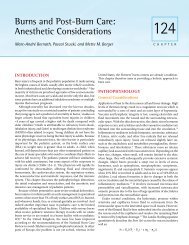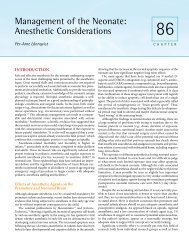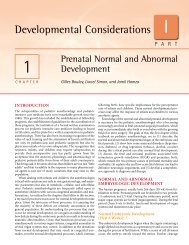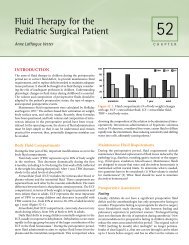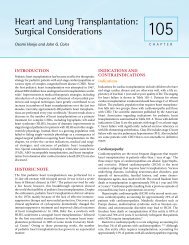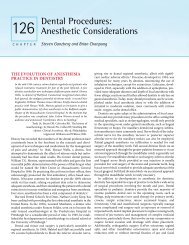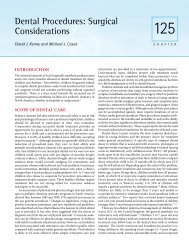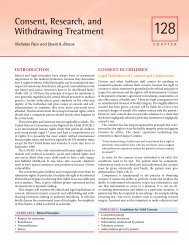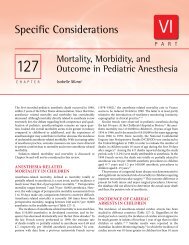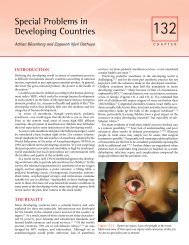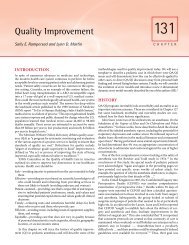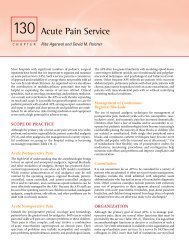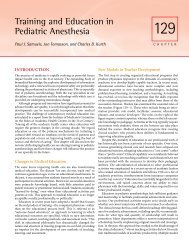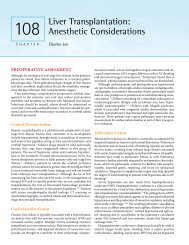Chapter 133
You also want an ePaper? Increase the reach of your titles
YUMPU automatically turns print PDFs into web optimized ePapers that Google loves.
2180 PART 6 ■ Specific Considerations<br />
developing countries have one nurse for more than 50 patients,<br />
especially at night. Consequently, postoperative care becomes the<br />
purview of the family. The family must assure that their family<br />
member receives sufficient pain medication, that I.V. fluids are<br />
administered and do not run out, and that postoperative wound<br />
care is done. The pediatrician or general practitioner must teach<br />
the parents to provide this care and tell them to contact the ward<br />
nurse if there is a problem. Discharge of patients from the hospital<br />
is the joint responsibility of the pediatrician/general practitioner<br />
and the surgeons. The family should be taught to care for the<br />
patient’s wound, including boiling water and cooling it before using<br />
it to cleanse the wound. Patients should go home with all of the<br />
materials (dressings, tape, antibiotics) needed for their wound care.<br />
Before discharge form the hospital, the family should be given a<br />
date, time, and place to return for suture removal if required.<br />
Before the team arrives, there should be a plan to manage<br />
postoperative complications that occur after patients are discharged<br />
from the hospital, especially when the team is no longer<br />
in the country. A host surgeon who is capable of providing this<br />
care is identified and provided with the resources needed. He or<br />
she usually removes sutures from patients who underwent surgery<br />
during the last week of the trip.<br />
Complicated procedures should be done early in the trip.<br />
Doing large procedures just before the team leaves for a weekend<br />
away or during their last week in the country may lead to<br />
unwanted problems. If possible, all patients should be discharged<br />
from the hospital before the team departs the site.<br />
QUALITY ASSURANCE<br />
Quality assurance (QA) is required to evaluate complications and<br />
untoward events. If a serious event occurs (e.g., death, near death,<br />
need for intensive care, return to the operating room for bleeding),<br />
the complication should be discussed by the team shortly after it<br />
occurs. The discussion should be nonaccusatory and should seek<br />
to determine the facts, much as a root cause analysis is performed<br />
in hospitals in the United States. Once the facts have been gathered<br />
and the cause(s) of the event determined, steps can be taken to<br />
prevent the complication from occurring again. Information<br />
collected should be sent to an interdisciplinary QA committee for<br />
further review. Each person involved in the event should send a<br />
written account of the event to the QA committee. If questions<br />
remain, the head of the committee can call people to obtain more<br />
information. Even events that lead to no harm (e.g., laryngospasm<br />
or return to the operating room for bleeding) should be reported<br />
to the QA committee so the committee can determine if there is a<br />
systemwide problem.<br />
Cardiac and respiratory arrest and death occur more commonly<br />
on trips than in developed countries. Fisher et al. 2 clearly<br />
outlined a method of dealing with these problems. This includes<br />
stopping surgery for a period of time to determine the cause(s) of<br />
the problems and to deal with peoples’ feelings. Not allowing<br />
people to express their feelings may interfere with the care of<br />
subsequent patients. A discussion should take place with family<br />
members shortly after the event so the family understands the<br />
problem and its possible causes. Host colleagues are usually very<br />
helpful with the family, because they understand the language and<br />
the culture and are best able to understand family needs. Also, the<br />
host must remain in the country and will be the one who will have<br />
to deal with the aftermath of these events. Discussions of deaths<br />
with host country sponsors are very important.<br />
EDUCATION<br />
One of the primary goals of a trip is to provide education that will<br />
help local physicians, nurses, and technicians provide surgical care<br />
for the patients themselves. The reasons why local groups cannot<br />
provide this care usually include lack of training, facilities, equipment,<br />
and people. Teams, not just surgeons, are needed. Teaching<br />
someone to do craniofacial surgery without someone who can<br />
provide an airway for the patient or people and facilities to<br />
appropriately care for the patient postoperatively is dangerous. If<br />
the site lacks the resources to do the surgery safely, the parent<br />
organization may be able to help the team succeed by helping the<br />
team acquire the needed equipment and supplies.<br />
Every trip is a chance to teach and learn; education is usually<br />
bidirectional. Physicians and nurses in the countries visited have<br />
devised interesting and ingenious ways of providing care for<br />
patients in systems that lack many things, 14 and we should learn<br />
from them. If we ask local anesthesiologists several months in<br />
advance of the trip if they are interested in didactic or other<br />
teaching, appropriate people can be staffed on the trip and time<br />
can be scheduled for teaching. If the site has residents, it can be<br />
determined if they can work with the team.<br />
What subjects do local physicians and nurses want discussed?<br />
Giving canned lectures that interest us but are of no benefit to the<br />
local doctors and nurses is a waste of time. Almost every site is<br />
interested in the difficult airway, block anesthesia, fluid and<br />
electrolytes, and blood replacement. Local anesthesia providers<br />
want to know how they can provide an airway safely for patients<br />
who have a difficult airway, and they want to know how to do it in<br />
the environment in which they work. There probably is no<br />
fiberoptic bronchoscope within hundreds or thousands of miles.<br />
Most local anesthesiologists have never heard of, let alone seen, a<br />
Glide scope. Teaching how to use these devices is seldom helpful.<br />
Teaching how to use a lightwand, however, especially if the team<br />
can leave a lightwand and stylets with them, may be life-saving. 15<br />
Showing them how to use very expensive anesthetic techniques<br />
may also be a waste of time if the local system cannot afford the<br />
drugs and equipment required. Teaching them to provide appropriate<br />
fluids and electrolytes, postoperative care, and postoperative<br />
pain relief is important. Hospitals in many countries do not<br />
provide narcotics or analgesics for postoperative pain relief. The<br />
patients or their families must buy the drugs from a pharmacy. If<br />
the family cannot afford the drugs, the patient receives no postoperative<br />
pain relief. Teaching practitioners how to use inexpensive<br />
drugs and techniques for pain relief will be advantages to<br />
many people.<br />
Another method of teaching is to send a visiting educator to a<br />
site to teach a specific technique or method. Visiting educators<br />
can be surgeons, anesthesiologists, nurses, or physical or speech<br />
therapists. The goal is to have local physicians, nurses, and therapists<br />
do sufficient procedures with the visiting educator to become<br />
proficient at doing them themselves. Visiting educators are less<br />
expensive because only one or two people go to the site. Like other<br />
trips, the outcome of these programs should be evaluated at the<br />
end of the course and 6 months as well as 1 year later. Did the local<br />
people actually use what they were taught? If so, was it used to<br />
treat the poor? If what they learned was not used, what prevented<br />
them from doing so? Was it lack of facilities, lack of equipment, or<br />
lack of patients? The parent organization many be able to help<br />
correct these deficits.<br />
Local teams can provide surgery for more poor people at a<br />
lower cost than visiting teams. Some organizations make this



